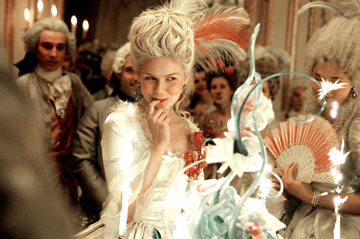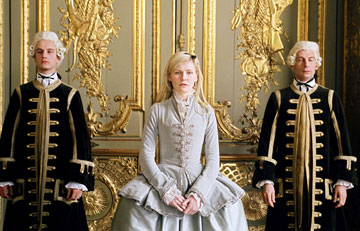 In my generally positive review of Lost in Translation a few years back, I complained that “this story could only have been written by deeply privileged people.” Well, Sofia Coppola’s newest film, Marie Antoinette, makes Lost in Translation seem like a working-class anthem. To be honest, I find my thoughts dwelling on Marie Antoinette in the few days since I saw it, and I’m liking it better in retrospect than I did while actually watching the movie. Still, Coppola’s film seems narrowly conceived to a fault. It conveys both the life-on-Mars quality of Versailles and the innocent decadence of privileged youth decently well (even if Antoinette was almost 35 by the time of the Revolution), but, in my humble opinion, the movie needed a lot more politics and a lot less in the way of shoes and pastries. As it is, despite all the wallowing in material delights, Marie Antoinette displays little in the way of a narrative arc, and, to my mind, it felt both unfinished and unsatisfying.
In my generally positive review of Lost in Translation a few years back, I complained that “this story could only have been written by deeply privileged people.” Well, Sofia Coppola’s newest film, Marie Antoinette, makes Lost in Translation seem like a working-class anthem. To be honest, I find my thoughts dwelling on Marie Antoinette in the few days since I saw it, and I’m liking it better in retrospect than I did while actually watching the movie. Still, Coppola’s film seems narrowly conceived to a fault. It conveys both the life-on-Mars quality of Versailles and the innocent decadence of privileged youth decently well (even if Antoinette was almost 35 by the time of the Revolution), but, in my humble opinion, the movie needed a lot more politics and a lot less in the way of shoes and pastries. As it is, despite all the wallowing in material delights, Marie Antoinette displays little in the way of a narrative arc, and, to my mind, it felt both unfinished and unsatisfying.
As the film begins, mirthful 14-year-old free spirit Marie Antoinette (Kirsten Dunst) has just been married off by her mother, the Empress Maria Theresa of Austria (Marianne Faithful), to the pudgy, young, and introverted dauphin of France, Louis XIV (Jason Schwartzman). And so we spend the first forty minutes of the film following young Marie’s introduction to the cauldron of social intrigue that is Versailles, where she is shuffled to and fro by her grim handler, the Comtesse de Noailles (Judy Davis, looking like the Borg Queen), and becomes the target of a whispering campaign due to her still-unconsummated marriage (a plot point that doesn’t work at all, given how far Dunst and Schwartzman are from 14 and 15 respectively.) At any rate, eventually Marie makes a few friends — most notably the Duchesse de Polignac (Rose Byrne) — and a few enemies, such as Madame Du Barry (Asia Argento), courtesan to Louis XV (Rip Torn). And she picks up several bad habits, including but not limited to gambling, shopping, all-night festivities, and the Count Axel von Fersen (Jamie Dornan), most of which are scored — usually pretty effectively — to post-punk or new wave tracks by Gang of Four (“Natural’s Not in It”), New Order (“Ceremony”), The Cure (“Plainsong”), and others.
 Of course, as we all know, the party can’t last forever, and Marie Antoinette’s reveries have a particularly nasty end. But the Revolution only takes up about fifteen minutes of the film here, and in fact is basically sidestepped (which feels a bit like making a movie about the Titanic and skipping the iceberg, but ah well.) Obviously, it was Coppola’s artistic decision not to wallow in the horrors that beset Antoinette’s final years, but that same lack of focus about anything other than good times at Versailles mars the rest of the film. Contrary to the figure portrayed here, Antoinette was engaged in the political issues facing her kingdom, particularly late in her reign. But, here’s she seems just a poor-little-rich-party-girl until the merde hits the fan in a big way in 1789. (There are a few scenes involving the French decision to aid the American Revolutionaries, I guess, but they seem unconnected to everything else going on and are in effect shoehorned in.)
Of course, as we all know, the party can’t last forever, and Marie Antoinette’s reveries have a particularly nasty end. But the Revolution only takes up about fifteen minutes of the film here, and in fact is basically sidestepped (which feels a bit like making a movie about the Titanic and skipping the iceberg, but ah well.) Obviously, it was Coppola’s artistic decision not to wallow in the horrors that beset Antoinette’s final years, but that same lack of focus about anything other than good times at Versailles mars the rest of the film. Contrary to the figure portrayed here, Antoinette was engaged in the political issues facing her kingdom, particularly late in her reign. But, here’s she seems just a poor-little-rich-party-girl until the merde hits the fan in a big way in 1789. (There are a few scenes involving the French decision to aid the American Revolutionaries, I guess, but they seem unconnected to everything else going on and are in effect shoehorned in.)
Which isn’t to say Marie Antoinette isn’t completely without merit. At times, it — much like The Virgin Suicides, Coppola’s first film — fashions out of the Antoinette story a haunting mediation on the doomed and fleeting transience of youth. (The New Order helps.) And there are several good performances in and around the margins, including Steve Coogan (always threatening to Tristam Shandy at any moment) as the Comte de Mercy-Argenteau and Danny Huston as Emperor Joseph II of Austria (although I do wish he’d thrown in a “hm-hm” to pay homage to Jeffrey Jones.) But, ultimately, this film is just too thin a take on Antoinette’s story to sustain interest over two hours. There’s barely any there there. Even subplots that should be in Coppola’s wheelhouse, given her choice of themes here, seem underdeveloped (most notably Antoinette’s rivalry with Du Barry — It happens, but doesn’t really amount to anything.) And, while the last few shots are undeniably haunting, they can’t justify the long and circuitous route it took to get there. I don’t have a problem with a sympathetic take on Marie Antoinette, per se, but it would’ve been nice to have seen a more fully-developed one.
